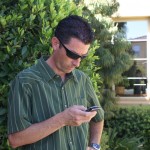Unplug and Reconnect™Love Technology…Love People More.™ |
Google Leader: Unplug & Reconnect
Of all the commencement advice we’ve heard this college graduation season, some of the best words of wisdom comes from none other than Google chairman Eric Schmidt.
In his commencement speech last week at Boston University, Schmidt urged students to unplug at least one hour a day.
“Take one hour a day and turn that thing off. Take your eyes off that screen and look into the eyes of the person you love. Have a conversation, a real conversation.”
Schmidt gave a nod to technological advances that have made us better connected – technologically – than ever before. He urged the new graduates to “harness the power,” but also reminded them, “The digital ties that bind our humanity together are not possible without technology, but it’s also not possible without you, without a heart.”
We at Unplug & Reconnect couldn’t agree more.
New Jersey Town Bans Texting While Walking
 A New Jersey town’s recent ban on texting while walking has captured our attention. Fort Lee, N.J., police will soon begin issuing $85 jaywalking tickets to pedestrians who are spotted texting while walking, according to ABC News.
A New Jersey town’s recent ban on texting while walking has captured our attention. Fort Lee, N.J., police will soon begin issuing $85 jaywalking tickets to pedestrians who are spotted texting while walking, according to ABC News.
The decision to ban texting was not a spontaneous one, but rather a legislative reaction to a string of three fatal accidents, all involving pedestrians who were texting while walking.
While some Fort Lee residents are upset with the ban, we think it’s a good way to highlight the dangers of texting while walking – or driving, for that matter.
The ABC News story points to a study by Stony Brook University in New York, which found that texters are 60 percent more likely to veer off course than non-texters, because the act of texting alters their gait when walking. The study also showed that texting interferes with memory.
“We want to raise awareness that a real disruption occurs because of texting,” Eric Lamberg, co-author of the study, told ABC News. “Texting disrupts your ability much more than does talking.”
Juror Tweets Posing Problem for Court System
 Jurors’ inability to refrain from posting information about court trials on social media sites like Twitter and Facebook poses a serious threat to the judicial system, with such behavior threatening mistrials and overturned verdicts, according to a recent report in the Wall Street Journal.
Jurors’ inability to refrain from posting information about court trials on social media sites like Twitter and Facebook poses a serious threat to the judicial system, with such behavior threatening mistrials and overturned verdicts, according to a recent report in the Wall Street Journal.
In one high-profile case, an accused murderer’s conviction was thrown out after a juror was found to have tweeted about the case on Twitter throughout the trial. The accused on trial, Erickson Dimas-Martinez, was found guilty of murder in March 2010 by an Arkansas jury and sentenced to death for the robbery-murder of a teenager. But in December, the Arkansas Supreme Court set aside the verdict and ordered a new trial – saying a juror who tweeted about the case was guilty of juror misconduct.
In other cases, jurors have been chastised and even held in contempt for “friending” defendants or plaintiffs on Facebook. And this month, a state appeals court in Sacramento, Calif., will hear a motion from defense attorneys in a gang-beating case asking to overturn verdicts against their clients in light of a juror posting information on Facebook during the trial.
Judges typically request that jurors refrain from posting online information about cases they are hearing. The judges are concerned about what jurors may say when they tweet or post, fearing that the jurors may reveal a bias about the case or disclose information that has not yet been made public.
But, while courts routinely impose social media bans on jurors during trials, it is proving quite a challenge to enforce these bans. The Wall Street Journal observes: “At a time when authorities can’t even stop some people from risking their lives by sending text messages while driving,” getting jurors to restrict their social media use is proving a particularly difficult feat.
Ten Reasons You Know You’re Addicted to Technology
 You woke up this morning with a cell phone clutched in your hand.
You woke up this morning with a cell phone clutched in your hand.- At dinner, you texted your son to pass the potatoes.
- After staring at screens, you now see rectangular objects when you close your eyes.
- On a family camping trip, you insist on driving 50 miles to the nearest wireless hot spot.
- Your idea of family game night is to break out the Xbox.
- You interrupt a romantic evening with your spouse to update your Facebook status.
- Your child asks for a playdate — via Outlook
- You “speak” with your best friend by email and don’t recognize her actual voice when she calls.
- Walking and talking on your cell phone, you almost fall into an open manhole.
- You spend your whole trip to the Grand Canyon peering through a video lens.
